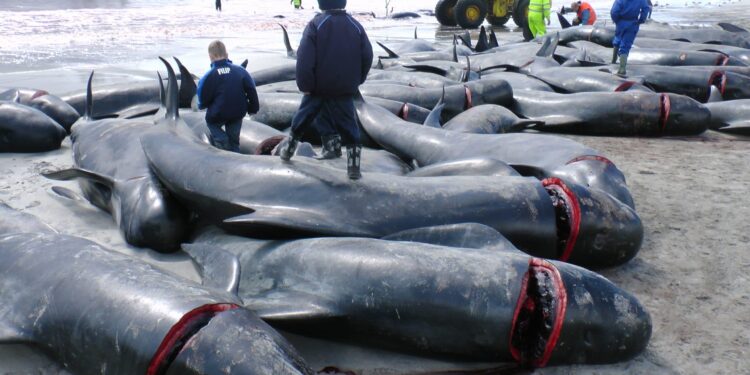Controversial whale hunts in the Faroe Islands have reignited global debate over the practice’s ethical and cultural implications, drawing parallels to similar traditions upheld in Northern Canada. As the small North Atlantic archipelago continues its annual pilot whale drives, environmentalists and indigenous advocates find themselves at the center of a complex discussion about heritage, conservation, and animal welfare. The Winnipeg Sun explores how these contentious hunts resonate beyond the Faroe Islands, reflecting broader questions about the preservation of indigenous customs in the modern world.
Controversial Whale Hunts in Faroe Islands Ignite Global Ethical Debate
The annual whale hunts in the Faroe Islands have once again drawn sharp criticism from animal rights activists and international observers. These traditional hunts, known locally as grindadráp, are defended by residents as a sustainable practice essential to their cultural heritage and communal identity. Critics argue, however, that the methods and scale of the hunts raise serious ethical questions in an era increasingly focused on wildlife conservation and animal welfare. This clash has reignited conversations about where to draw the line between cultural tradition and modern ethical standards on the global stage.
Interestingly, parallels are being drawn to Indigenous hunting traditions in Northern Canada, where communities engage in regulated hunts for subsistence, firmly rooted in deep respect for the environment and sustainable harvest principles. The comparison highlights key factors often overlooked in the Faroe debate: local stewardship, scientific oversight, and community consensus. The table below contrasts some fundamental distinctions in these two practices, offering insight into why the global reaction varies so widely.
| Aspect | Faroe Islands Whale Hunts | Northern Canadian Traditions |
|---|---|---|
| Primary Purpose | Cultural tradition & local consumption | Subsistence & cultural survival |
| Species Targeted | Pilots whales and other small cetaceans | Belugas, narwhals, and other whales |
| Regulation & Oversight | Community-based, with limited scientific input | Government and Indigenous co-management |
| Global Reactions | Often negative and focused on ethics | Generally more supportive due to sustainability |
- Cultural significance: Both regions emphasize tradition but differ in public accountability.
- Environmental impact: Northern Canadian hunts undergo rigorous quotas; Faroese practices face questions on scale.
- Public perception: Ethical debates remain polarized domestically and internationally.
Cultural Traditions and Conservation Challenges in Northern Canada
In Northern Canada, Indigenous communities have long upheld the practice of whale hunting, a tradition deeply intertwined with their cultural identity and survival. These hunts are governed by strict customs that prioritize respect for the animal and sustainability. However, as global environmental awareness grows, the balance between cultural preservation and conservation efforts becomes increasingly delicate. Critics often challenge these practices, citing concerns over dwindling whale populations, yet Indigenous groups emphasize their reliance on time-honored knowledge systems that have maintained ecological balance for generations.
Unlike commercial whaling, these hunts are embedded with ritualistic significance and serve as vital sources of nutrition, clothing, and tools. The challenges faced in Northern Canada are complicated by external pressures such as climate change, habitat disruption, and international scrutiny. The debate mirrors the controversy surrounding the Faroese whale hunts, highlighting a broader conflict between cultural traditions and modern conservation imperatives.
- Traditional quotas set by Indigenous councils
- Community-led conservation and monitoring programs
- International regulations vs. cultural exemptions
- Impact of climate change on whale migration patterns
| Factor | Impact on Whale Hunts | Community Response |
|---|---|---|
| Climate Change | Shift in whale migration | Adapted hunting seasons |
| International Pressure | Increased regulations | Emphasis on cultural rights |
| Population Data | Concerns on species health | Collaborative research projects |
| Economic Factors | Limited commercial value | Focus on subsistence use |
Balancing Heritage and Sustainability Recommendations for Indigenous and Local Communities
Indigenous and local communities around the globe face the complex challenge of preserving their cultural heritage while engaging in sustainable practices that protect the environment. The whale hunts in the Faroe Islands, deeply rooted in tradition, highlight a broader conversation mirrored in Northern Canada’s Inuit communities, where subsistence whaling remains integral to cultural identity and food security. To navigate these tensions, recommendations emphasize collaborative governance models that include Indigenous voices in decision-making processes, respecting both ancestral knowledge and modern conservation science.
Effective approaches must balance cultural sensitivities with ecological responsibility. Key strategies suggest:
- Community-led monitoring: Empowering local stakeholders to assess and manage wildlife populations.
- Adaptive management: Adjusting hunting quotas based on real-time scientific data combined with traditional insights.
- Education and transparency: Facilitating open dialogue between Indigenous groups, governments, and the public to foster mutual understanding.
| Community | Hunting Practice | Conservation Status |
|---|---|---|
| Faroe Islands | Grindadráp (pilot whale hunts) | Monitored |
| Northern Canada | Subsistence bowhead whale hunting | Sustainable |
| Greenland | Traditional narwhal hunts | Regulated |
In Retrospect
As the debate over the controversial whale hunts in the Faroe Islands continues to ignite global attention, echoes of similar practices in Northern Canada remind us of the complex intersections between tradition, cultural identity, and modern conservation concerns. Balancing respect for indigenous heritage with evolving ethical and environmental standards remains a challenge that communities and policymakers alike must navigate carefully. The ongoing discussion highlights the need for informed dialogue that considers both historical context and contemporary values in addressing wildlife management and cultural preservation.
















